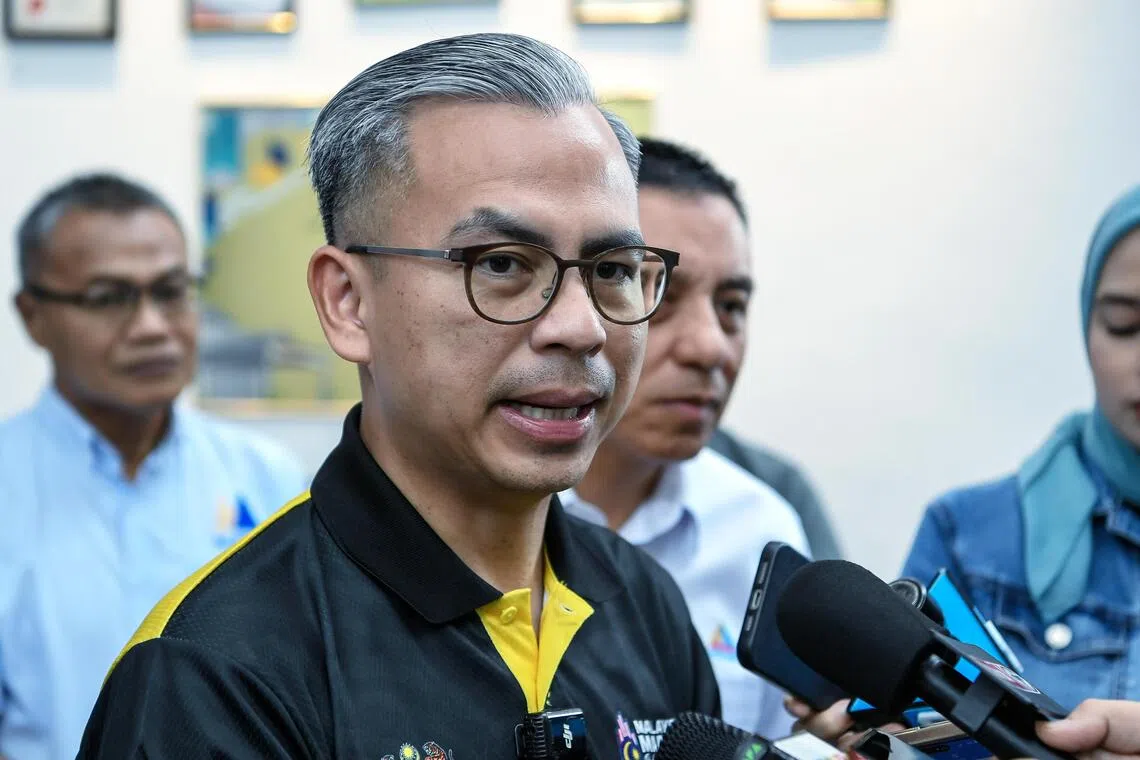Suspension of Malaysiakini’s Facebook pages remains a mystery as minister denies taking action
Sign up now: Get ST's newsletters delivered to your inbox

Malayisa Communication and Multimedia Minister Fahmi Fadzil said he reached out to Meta over the matter.
PHOTO: BERNAMA
Follow topic:
- Communications Minister Fahmi denies government involvement in the temporary suspension of Malaysiakini's Facebook accounts on Sept 30, stating Meta found no policy violations.
- Malaysiakini said it contacted Meta about the suspension, receiving confirmation of investigation at 6.48pm and restoration at 8.05pm after publishing an exposé.
- Media freedom advocates express concern, urging transparency from Meta and safeguards against disruptions, warning of a "chilling message" and potential self-censorship.
AI generated
KUALA LUMPUR – Malaysia’s Communications Minister on Oct 1 denied that the government had temporarily suspended two Facebook accounts of prominent independent media outlet Malaysiakini on Sept 30, an event that raised hackles about media freedom.
Facebook owner Meta also did not suspend those accounts for a couple of hours on Sept 30, Communications Minister Fahmi Fadzil told reporters, saying he had contacted the company’s top official in Singapore.
His response raised questions about the hidden hand behind the suspension of the Facebook pages of Malaysiakini and KiniTV from around 6pm on Sept 30. This was soon after Malaysiakini published a story alleging that a network of accounts was boosting support for the Facebook page of Prime Minister Anwar Ibrahim.
“I would like to clarify that I and the Malaysian Communications and Multimedia Commission (MCMC) did not receive any complaints or file any investigation regarding this report. We also reached out to Meta on the matter,” Datuk Fahmi said during a weekly media briefing in Putrajaya.
He further said that a special team from Meta, which is based in Singapore and reviews Coordinated Inauthentic Behaviour (CIB) issues, “confirmed that no CIB activity was detected among the 263 accounts and that no Facebook page was removed”.
Meta, the platform owner, also confirmed it had found no policy violations and took no action against the accounts or Malaysiakini’s page, Mr Fahmi said.
Since the start of the Anwar administration, some media outlets and social media users have complained about their accounts being suspended, pages blocked or websites made inaccessible, often after publishing content critical of the government or, in other cases, content deemed sensitive on religious or security grounds.
Mr Fahmi and MCMC have repeatedly denied ordering such actions or being involved in suspensions of platforms including TikTok, YouTube and Facebook.
The episode involving Malaysiakini, though lasting only a couple of hours, drew concerns from advocates of media freedom and analysts, who warned that even the temporary suspension of a major news outlet can limit public access to reliable information, crimp journalism and underscore the broader challenges of reporting on politically sensitive issues in Malaysia.
Malaysiakini is Malaysia’s leading independent online news site, known for critical reporting on government and political affairs.
Malaysiakini, reacting to Mr Fahmi’s statement that Meta did not receive any queries about the suspension, said: “Malaysiakini immediately contacted Meta representatives via WhatsApp and e-mail. At 6.48pm, a Meta representative confirmed receipt of their messages and said the matter was under investigation. By 8.05pm, Malaysiakini had received an e-mail confirming that its pages had been restored.”
Malaysiakini on Sept 30 issued a statement to readers following the suspension, explaining that its pages were briefly suspended due to alleged violations of Facebook’s community standards.
“The suspension came shortly after we published our recent expose, ‘Network of 263 ‘cyber troopers’ spurs Anwar’s FB support’. We apologise for any inconvenience this may have caused and thank you for your continued support.”
Opposition Parti Islam SeMalaysia’s information chief Ahmad Fadhli Shaari described the episode as “a national embarrassment”.
“It appears the Prime Minister has been relying on fake accounts to boost his rating on social media. How much public funding has been used for this? If these allegations are untrue, take immediate action. This is truly humiliating for the country,” he said.
The Prime Minister’s Office denied any knowledge or involvement in the alleged network, and confirmed no public funds were used in connection with the accounts.
Gerakan Media Merdeka (Geramm), a Malaysian coalition of media practitioners and press freedom advocates, expressed concern over the suspension.
“In Malaysia, where independent journalism already operates under pressure, the removal of such a critical outlet from a major digital platform should not be seen as just another technical glitch, as it undermines the public’s right to reliable information.” said Geramm spokesman Radzi Razak.
“Press freedom is not just about protection from government censorship, but it also means journalists must reach audiences without arbitrary disruption.”
He urged Meta to establish transparent, accountable moderation mechanisms for news media, including clear notice and takedown procedures, a fast appeal channel and independent oversight.
He also called on the government to avoid using such incidents to justify authoritarian regulation, and instead enact safeguards to protect journalistic content on digital platforms.
Ms Wathshlah Naidu, executive director of the Centre for Independent Journalism, a non-profit organisation promoting media freedom, also weighed in.
“What is really troubling is that Meta had denied suspending those pages. First, questions must be asked whether it was really related to the article. There is no conclusive evidence, but the timing raises concern,” she said.
“In the context of press freedom, even a temporary suspension sends a chilling message. Smaller outlets with limited resources face a higher risk of self-censorship because contesting platform actions is costly and difficult.”
Ms Wathshlah added: “There is very little transparency. We do not know whether the action was requested by the government, initiated by Meta, or the result of automated monitoring. For press freedom to be meaningful, media outlets need clarity. Meta should provide (information such as) which community standards were allegedly violated and ensure due process.”
• Sign up for our weekly Asian Insider Malaysia Edition


